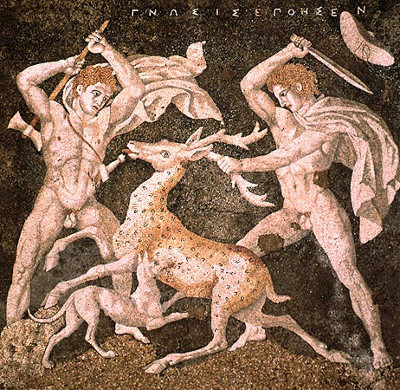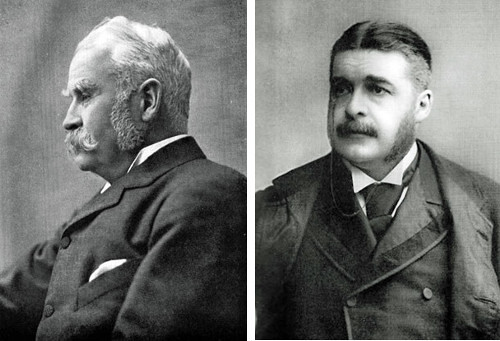A and B are playing a simple game. Between them are nine tiles numbered 1 to 9. They take tiles alternately from the pile, and the first to collect three tiles that sum to 15 wins the game. Does the first player have a winning strategy?
Unquote

“It is well to read everything of something and something of everything.” — Henry Brougham
“Try to learn something about everything and everything about something.” — Inscribed on Thomas Huxley’s memorial
“The whole secret of life is to be interested in one thing profoundly and in a thousand things well.” — Horace Walpole
Podcast Episode 22: The Devil’s Hoofmarks

On Feb. 9, 1855, the residents of Devon in southern England awoke to find a bewildering set of footprints in the newfallen snow. “These are to be found in fields, gardens, roads, house-tops, & other likely and unlikely places, deeply embedded in snow,” ran one contemporary account. “The shape was a hoof.”
In this episode of the Futility Closet podcast we’ll examine the surviving descriptions of the odd marks and consider the various explanations that have been offered. We’ll also revisit the compassionate Nazi fighter pilot Franz Stigler and puzzle over how to sneak into Switzerland across a guarded footbridge.
The Stag Hunt

Rousseau asks: Suppose that you and I hunt a stag. This requires long hours lying in wait along the trail, and it entails the risk that the stag will not appear. If, after some time has passed, a hare appears, either of us could seize it, abandoning the hope of capturing the stag but getting an immediate meal for himself. To hunt the stag successfully we have to agree to trust one another, knowing that each of us has an immediate reason to betray the other.
This gets even harder when many people are involved. David Hume writes, “Two neighbors may agree to drain a meadow, which they possess in common; because ’tis easy for them to know each others mind, and each may perceive that the immediate consequence of failing in his part is the abandoning of the whole project. But ’tis difficult, and indeed impossible, that a thousand persons shou’d agree in any such action.”
How did our society ever get off the ground when cooperation requires a faith in one another that simple self-reliance does not? It seems that our very rationality makes such a leap harder: Animals such as social insects work harmoniously together, but “the agreement of these creatures is natural,” writes Thomas Hobbes. “That of men is by covenant only, which is artificial.”
The Wire Identification Problem

A conduit carries 50 identical wires under a river, but their ends have not been labeled — you don’t know which ends on the west bank correspond to which on the east bank. To identify them, you can tie together the wires in pairs on the west bank, then row across the river and test the wires on the east bank to discover which pairs close a circuit and are thus connected.
Testing wires is easy, but rowing is hard. How can you plan the work to minimize your trips across the river?
Shop Talk

In 1869, composer Frederic Clay introduced W.S. Gilbert to Arthur Sullivan.
“I am very pleased to meet you, Mr. Sullivan,” said Gilbert, “because you will be able to settle a question which has just arisen between Mr. Clay and myself. My contention is that when a musician who is master of many instruments has a musical theme to express, he can express it as perfectly upon the simple tetrachord of Mercury (in which there are, as we all know, no diatonic intervals whatever) as upon the more elaborate disdiapason (with the familiar four tetrachords and the redundant note) which (I need not remind you) embraces in its simple consonance all the single, double, and inverted chords.”
This was gobbledegook that Gilbert had simply cooked up; he wanted to see whether it would “pass muster with a musician.”
Sullivan asked him to repeat the question, then politely said he would like to think it over before making a reply. In 1891 Gilbert said, “I believe he is still engaged in hammering it out.”
In a Word
apprecation
n. a prayer or devout wish
An 1898 item in the New York Times notes that William Gladstone once attended a Presbyterian service in Scotland where the minister said, “We pray Thee, Lord, of Thy goodness, to bless the Prime Minister of this great nation, who is now worshipping under this roof in the third pew from the pulpit.” And a Presbyterian minister opening an outdoor event reportedly prayed, “In consequence of the rain, O Lord, and by reason of the regretted absence of the Princess of Lochnagar, caused, doubtless, by the stormy weather, I do not purpose to address Thee at any length.”
Before a battle in the Irish rebellion of 1641, John Leslie, bishop of Clogher, prayed, “O God, for our unworthiness we are not fit to claim Thy help: but if we are bad our enemies are worse, and if Thou seest not meet to help us, we pray Thee help them not, but stand Thou neuter this day, and leave it to the arm of flesh.”
(During the American Civil War, Abraham Lincoln said, “We, on our side, are praying to Him to give us victory, because we believe we are right; but those on the other side pray to Him, look for victory, believing they are right. What must He think of us?”)
In his 1863 history of France, Victor Duruy tells of a soldier named La Hire who sought absolution from a priest during the siege of Montargis in 1427. The priest asked him to confess first, and he said, “I have not time, for I must fall upon the English. But I have done all that a man of war is wont to do.” The chaplain gave him absolution such as it was, and La Hire fell on his knees by the roadside and said, “God, I pray thee that to-day thou wilt do for La Hire that which thou wouldst have La Hire do for thee, if he were God and thou were La Hire.”
Others think the notion of a timeless God, with its perceptual metaphor of God passively perceiving each and every moment of time in a single, unchanging, comprehensive vision, fails to give God the freedom to act in creation, in particular, in the future. Suppose a student receives acceptances from three different universities and is trying to decide which to attend. She prays to God: ‘Lord, at which of the three universities will I have the best overall collegiate experience?’ On the timelessness view, God sees only the choice our petitioner actually makes, not the alternative futures that would have transpired had she chosen to go elsewhere. So how can God answer this prayer?
— W. Jay Wood, God, 2011
“Whatever a man prays for, he prays for a miracle. Every prayer reduces to this: ‘Great God, grant that twice two be not four.'” — Turgenev
See Asking Back.
Self-Replicating Resistors
From Lee Sallows:

In an electrical network, if resistors x and y are placed in series their total resistance is x + y; if they’re placed in parallel it’s 1/(1/x + 1/y).
This offers an intriguing opportunity for self-reference. Each of the networks above contains four resistors with values 1, 2, 3, and 4, and the total resistances of the networks themselves are 1, 2, 3, and 4. So any one of the numbered resistors in these networks can be replaced by one of the networks themselves.
The challenge was posed by Sallows and Stan Wagon as a Macalester College “problem of the week”; these examples were discovered by Brian Trial, an automotive electronics engineer from Ferndale, Mich. Sallows points out that any such solution has a dual that results from changing series connections to parallel, and vice versa, and then replacing all resistors values by their reciprocals.
This leads to a further idea: The two sets of resistors below are “co-replicating” — the four networks on the left can be used to replace the four resistors in any of the networks on the right, and vice versa.

(Thanks, Lee.)
Post Haste
Letter from Lewis Carroll to Winifred Stevens, May 22, 1887:
My dear Winnie,
But you will be getting tired of this long letter: so I will bring it to an end, and sign myself,
Yours affectionately,
C.L. Dodgson
Sleeping Alone
Lori has an icky problem: Worms keep crawling onto her bed. She knows that worms can’t swim, so she puts each leg of the bed into a pail of water, but now the worms crawl up the walls of the room and drop onto her bed from the ceiling. She suspends a large canopy over the bed, but worms drop from the ceiling onto the canopy, creep over its edge to the underside, crawl over the bed, and drop.
Desperate, Lori installs a water-filled gutter around the perimeter of the canopy, but the worms drop from the ceiling onto the outer edge of the gutter, then crawl beneath. (The worms are very determined.) What can Lori do?

